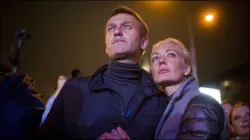'Putin will not go unpunished': Alexei Navalny's wife warns after his death in Arctic prison
Western leaders and others who resisted Putin's rule praised Navalny's bravery after reports of his death emerged. Navalny was behind bars since 2021 after a fatal nerve poisoning, and has been convicted three times of various offences that amounted to an over 30-year-sentence.

Munich: Russian President Vladimir Putin and his associates will not go unpunished if the death of Alexei Navalny, his wife Yulia Navalnaya said at the Munich Security Conference on Friday. This came as Russian prison authorities announced that Navalny felt unwell after a walk at a penal colony and almost immediately fell unconscious, after which all attempts to revive him failed.
Navalny, a longtime fierce critic of Putin and the Kremlin, was serving a 30-year-old sentence at a “special regime” penal colony — the highest security level of prisons in the country — above the Arctic Circle. His wife said she was skeptical about the news of her husband's death because it had come from Russian government sources.
"We cannot trust Putin and the Putin government. They always lie. But if this is true, I want Putin, his entire entourage, Putin's friends, his government to know that they will bear responsibility for what they did to our country, to my family, to my husband. And this day will come very soon," said Navalnaya, who was solemn and tearful during the speech.
She called on the international community to unite against what she called Russia's "horrible regime". "Both this regime and Vladimir Putin must bear personal responsibility for all the terrible things they have been doing to my country, to our country, Russia, in recent years," she said.
Navalny's death sparks international outrage
Navalny is survived by his wife and two children, Daria and Zakhar. The Kremlin said it had no information on the cause of Navalny's death and Putin has been informed of the matter. Reports of his death sparked international outrage, with many directly accusing Putin's involvement.
"I don't want to hear any condolences. We saw him in prison on the (Feb) 12, in a meeting. He was alive, healthy and happy," said Navalny's mother Lyudmila Navalnaya.
"First and foremost, if these reports are accurate, our hearts go out to his wife and his family. Beyond that, his death in a Russian prison and the fixation and fear of one man only underscores the weakness and rot at the heart of the system that Putin has built. Russia is responsible for this," said US Secretary of State Antony Blinken in Munich. "In today's Russia, free spirits are put in the Gulag and sentenced to death," said French President Emmanuel Macron.
German Chancellor Olaf Scholz recalled his meeting with Navalny after he was recovering in Berlin after a nerve agent poisoning in 2020 and said he "paid for his courage with his life". German Foreign Minister Annalena Baerbock said, "Like no one else, Alexei Navalny was a symbol for a free and democratic Russia. That is precisely the reason he had to die."
Ukrainian President Volodymyr Zelenskyy was more direct with his words. "It is obvious: he was killed by Putin, as thousands of others were tortured and martyred by this one ‘creature’. Putin does not care who dies as long as he keeps his position. And that is why he should not keep anything. Putin should lose everything and answer for what he has done," he said.
"This is terrible news. As the fiercest advocate for Russian democracy, Alexei Navalny demonstrated incredible courage throughout his life," said British Prime Minister Rishi Sunak, while his foreign minister David Cameron called for Putin to be held accountable.
Who was Alexei Navalny?
Navalny crusaded against official corruption in Russia and staged massive anti-Kremlin protests as Putin’s fiercest foe. The stunning news of his death, ess than a month before an election that will give Putin another six years in power, brought renewed criticism and outrage directed at the Kremlin leader who has cracked down on all opposition at home.
In Putin’s Russia, political opponents often faded amid factional disputes or went into exile after imprisonment, suspected poisonings or other heavy repression. But Navalny grew consistently stronger and reached the apex of the opposition through grit, bravado and an acute understanding of how social media could circumvent the Kremlin’s suffocation of independent news outlets.
Navalny has been convicted of multiple offences, all of which he decried as politically motivated. He was arrested in January 2021 after he suffered a near-fatal nerve agent poisoning, which he blamed on the Kremlin. He fell into a coma after a suspected poisoning using novichok by Russia’s FSB security service and was evacuated to Germany for treatment. He recovered and returned to Russia in January 2021, where he was arrested on a parole violation charge and sentenced to his first of several jail terms.
The poisoning sparked international outrage and worsened relations between Russia and the West, which had introduced sanctions on top Russian officials close to Putin. Traces of Novichok were also found in the 2018 British case of the poisoning of Russian double agent Sergei Skripal and his daughter.
(with inputs from agencies)
ALSO READ | Who was Alexei Navalny? All you need to know about the deceased Russian opposition leader